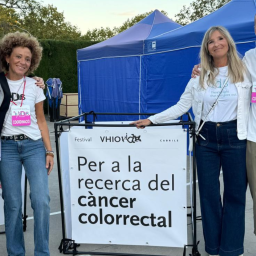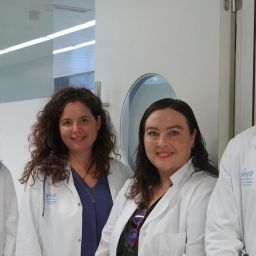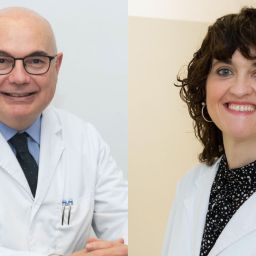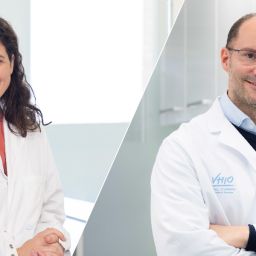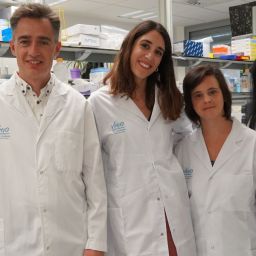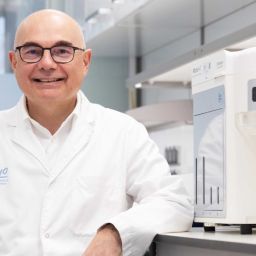
Dr. Mate Maus, head of the Aging and Cancer Group at VHIO, has been awarded the XXVIII FERO Grant for a project investigating how age-related metabolic changes can accelerate colorectal cancer development and identifying biomarkers for early detection. Dr. Ana Ruiz-Sáenz, Ikerbasque researcher at CIC bioGUNE, received the VI FERO-ghd Project in Breast Cancer to study how altered glycosylation in tumor cells can impact the efficacy of antibody-drug conjugates in treating HER2-positive breast cancer.
The FERO Foundation has announced the winners of the XXVIII FERO Grant and the VI FERO-ghd Project in Breast Cancer. This year, 160,000 euros have been distributed between the two recipients to support the execution of their projects. These grants focus on exploring how age-related metabolic changes influence colorectal cancer development and how altered glycosylation in tumor cells affects the efficacy of antibody-drug conjugates in breast cancer.
The official award ceremony was held during a charity dinner sponsored by KETTAL and AstraZeneca, on Monday, November 4, at the Rosewood Villa Magna Hotel in Madrid, attended by over 250 guests. The event, hosted by Roberto Brasero and led by Silvia Garriga, president of the FERO Foundation, alongside vice presidents Sol Daurella and Angie Miquel, gathered prominent figures from the scientific and social communities.
“At FERO, we firmly support translational research, exemplified by our alliance with the Hospital 12 de Octubre, a reference center in Madrid. Events like this allow us to continue funding key projects that improve cancer diagnosis and treatment,” commented Silvia Garriga, highlighting that all proceeds from the event will be allocated to bolstering FERO Foundation’s support for the Cancer Center at Hospital 12 de Octubre.
Rubén Ventura, general director of the FERO Foundation, also emphasized the rising quality of the submitted projects. “Each year, the level of the candidates is higher, and the competition fiercer. The jury’s deliberation was particularly tight this edition, reflecting the growing talent of researchers in the oncology field.”
In this edition, both the XXVIII FERO Grant and the VI FERO-ghd Project are endowed with 80,000 euros each, to be implemented over two years for their respective translational research projects.
Improving Early Detection of Colorectal Cancer in Young Patients
Dr. Mate Maus, head of the Aging and Cancer Group at VHIO, has been selected as the recipient of the XXVIII FERO Grant for his project on early-onset colorectal cancer (EO-CRC). This type of cancer is increasingly affecting individuals under 50, a group not typically included in routine colonoscopy screening programs. Consequently, these patients are often diagnosed at advanced stages when treatment is more difficult. Therefore, there is an urgent need to develop affordable, non-invasive methods to assess the risk of colorectal cancer in those under 50, allowing for the identification and early monitoring of high-risk individuals.
This project aims to explore the relationship between age-related metabolic changes in the colon and early-onset cancer development. “We know that certain biological processes associated with aging, such as iron dysregulation, might be accelerated in young people who develop this type of cancer. The central hypothesis is that these changes in iron metabolism within the colon’s microenvironment may foster the emergence of precancerous clones, thus accelerating tumor formation in younger individuals,” explains Dr. Maus.
To address this, the study will employ various scientific approaches, including analysis of patient tissue samples and animal models, to observe how iron accumulates in the colon. Biological pathways linking iron metabolism alterations to cancer growth will also be examined. Experiments using organoids—cell structures that mimic colon behavior—will help to understand how changes in iron levels affect the survival of normal and cancerous cells. Additionally, the potential for detecting iron imbalance through biomarkers in fecal samples will be assessed, paving the way for a non-invasive method to identify at-risk individuals.
“The potential impact of this research is substantial. If changes in iron metabolism are linked to early colorectal cancer development, it may be possible to create a simple stool test to identify young individuals at higher risk,” adds Dr. Maus. This could enable earlier monitoring and detection in young patients, significantly improving survival rates and preventing cancer from advancing to harder-to-treat stages.
Key Insights into Tumor Glycosylation in Breast Cancer Treatment
The other awardee at the Madrid event was Dr. Ana Ruiz-Sáenz, an Ikerbasque researcher at CIC bioGUNE, who received the VI FERO-ghd Project in Breast Cancer for her research into how tumor glycosylation affects the efficacy of antibody-drug conjugates (ADCs) used in treating HER2-positive breast cancer. ADCs are transforming cancer treatment by combining antibodies that target tumor cells with drugs that destroy them. “These targeted treatments are being used to combat various types of cancer, including HER2-positive breast cancer. In this type of cancer, ADCs are designed to target a key protein on the surface of tumor cells, called HER2. This cell surface is highly glycosylated, meaning it is modified with sugars, and among this dense layer of sugars lies HER2, the gateway for ADCs into the tumor cell,” explains Dr. Ruiz-Sáenz.
Glycosylation, the process of adding sugars to proteins, changes in cancer cells and plays an important role in tumor progression, influencing growth, immune evasion, and cancer spread. These changes in the sugar coating surrounding tumor cells could also affect the binding and efficacy of ADCs. “Based on previous studies, this project aims to understand how those changes in tumor glycosylation influence therapy effectiveness. To do this, we will alter the tumor glycosylation profile and analyze its impact on ADC efficacy using molecular techniques, 3D co-culture systems, and animal models,” says Dr. Ruiz-Sáenz.
“We hope our results will show for the first time how tumor glycosylation influences the response to one of the most widely used ADCs for treating HER2+ breast cancer, T-DM1. These findings could have broader implications, shedding light on the efficacy of other ADCs, such as the recently approved T-DXd, which has shown exceptional results in other types of cancer,” Dr. Ruiz-Sáenz continues. She adds that this study could also identify new ways to predict which patients will respond better to these treatments, based on changes in tumor cell glycosylation, potentially maximizing the future use of these powerful drugs.
About the Grants
This edition saw 32 research projects submitted for the new grant call, with 22 competing for the FERO Grant and 10 for the FERO-ghd Project. Now in its 15th year, the initiative aims to promote the development of translational cancer research. The FERO grant selection is conducted by a jury composed of 12 independent, leading oncology researchers in Spain, led by Dr. Andrés Cervantes, head of the Medical Oncology Service at the University Clinical Hospital of Valencia and president of the Grant Jury. The jury includes figures such as Dr. Josep Tabernero, director of Vall d’Hebron Institute of Oncology (VHIO); Dr. Akaitz Carracedo, Ikerbasque researcher at CIC bioGUNE; Dr. Luis Paz-Ares, head of the Medical Oncology Service at Hospital 12 de Octubre in Madrid; Dr. Ana Lluch, coordinator of the Breast Cancer Biology Research Group at INCLIVA Health Research Institute in Valencia; and Dr. Aleix Prat, head of the Medical Oncology Service at Hospital Clínic of Barcelona.

